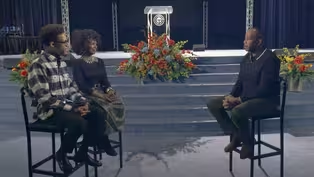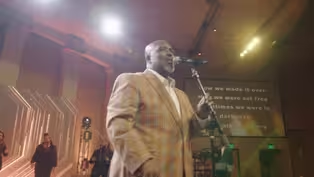
Origins, evolution of gospel with Dr. Deborah Smith Pollard
Clip: Season 52 Episode 7 | 5m 14sVideo has Closed Captions
Origins, evolution of gospel with Dr. Deborah Smith Pollard
Few know the history of gospel music better than gospel radio host and historian Dr. Deborah Smith Pollard. In conjunction with the PBS docuseries, “GOSPEL,” Pollard talks about the origins of gospel music and how it has evolved over the years to the sound we hear today from contemporary gospel artists.
Problems playing video? | Closed Captioning Feedback
Problems playing video? | Closed Captioning Feedback
American Black Journal is a local public television program presented by Detroit PBS

Origins, evolution of gospel with Dr. Deborah Smith Pollard
Clip: Season 52 Episode 7 | 5m 14sVideo has Closed Captions
Few know the history of gospel music better than gospel radio host and historian Dr. Deborah Smith Pollard. In conjunction with the PBS docuseries, “GOSPEL,” Pollard talks about the origins of gospel music and how it has evolved over the years to the sound we hear today from contemporary gospel artists.
Problems playing video? | Closed Captioning Feedback
How to Watch American Black Journal
American Black Journal is available to stream on pbs.org and the free PBS App, available on iPhone, Apple TV, Android TV, Android smartphones, Amazon Fire TV, Amazon Fire Tablet, Roku, Samsung Smart TV, and Vizio.
Providing Support for PBS.org
Learn Moreabout PBS online sponsorshipThe new PBS documentary series, "Gospel," by Henry Louis Gates Jr. examines the rich history of gospel music and its impact on the black church.
You can see the conclusion of the series tonight at 9:00 pm.
Meanwhile, we are exploring Detroit's gospel connection, right here on "American Black Journal."
Let's start with a look at the evolution of gospel music with WMXD Gospel Radio host and historian, Dr. Deborah Smith Pollard.
- It reflects the message that the church is about, which is God loves us, Jesus Christ died for us, salvation is for all of us, and His mercy and grace is what gets us through even when we've not been so good, okay, and even when we're facing tough times.
Now, the other part of it is that the music reflects the creativity of our community.
♪ Lord, I thank you ♪ I thank you for this ♪ Lord, I thank you ♪ I thank you for that ♪ Right about that ♪ Two o'clock in the morning Chicago is, of course, called the birthplace of it, because that's where Thomas Dorsey, Mahalia Jackson, and so many others came together, or they were situated there.
♪ I've been falling and writhing all these years ♪ ♪ But you know my soul But when the convention, the National Convention of Gospel Choirs and Choruses, started in the 1930s, the third year after they were formed, they were here in Detroit, and Detroit embraced it.
It goes back to even as early as the 1800s, the 19th century is where we had basically a split in the black church.
To this day, there are churches that are like, "Whoa, okay, this is kind of a lot.
We can have the softer kind, the quieter kind, but not that kind where people are clapping and playing tambourines and moving a lot."
They don't want that kind.
So this idea that every black church does everything the same way, no, that's not true.
♪ What a happy day ♪ What a happy day ♪ What a happy day ♪ What a happy day ♪ When Jesus was When Edwin Hawkins brought in "Oh Happy Day," oh my goodness, oh my goodness.
He had an interview in a book with Dr. Bobby Jones, and he talks about how people came from the church, and said, "People are dancing to your song in clubs, how dare you?
That's not sacred."
And of course, again, today, it seems to be quite traditional.
So then we move on to Kirk Franklin, and trust me, in a minute, there's gonna be somebody else, 'cause we have gospel trap.
"Gospel, oh no, they can't go together."
Well, because the music comes from the community, okay?
It's not born in church.
Let's just even say, we think about Twinkie Clark, and "You Brought the Sunshine," she wasn't supposed to be listening to secular music, but she loves Stevie Wonder.
She heard reggae, she included reggae with that one, and that song just, to this day is one of the most beloved songs we have.
So it reflects the gospel.
She says, "You know, won't he open doors for you?"
I'm talking about Jesus.
I mean, part of the lyrics in there still reflects the message, but the sound, the instrumentation changes over time.
♪ La la la la la la la la la - Let's party.
♪ He taught me how - Some people are like, "We want to sing quietly.
We want to sound, let's just say more European."
And then there are others that, "We wanna be ourselves."
And so there was that split.
So there is, I wanna say, yeah, there continues to be that kind of dichotomy.
And then even layers within the dichotomy, just because some people think that a quieter sound is what we should reflect to show that we have what to them "Evolved," okay?
And to other people, it's like, "We want to sing the way that it reflects who we are."
And we have a range of sound.
In my first book, "When the Church Becomes Your Party," the last chapter is about Christian rap, you know?
And so I talk about how, in some ways, people could just step back before they say, "Oh, that's not what we are."
Okay, so there was an article I wrote, which is like, "The ladies have on all their clothes," 'cause I asked these young people, "What makes gospel rap different from rap?"
And they said, "women have on all their clothes, okay?"
Which just made me fall out laughing.
I said, "Okay, that's gonna be part of a title."
Okay, so besides that point, certainly, again, the message is in place, the message of Jesus Christ.
♪ God is ♪ God is ♪ He is Play whatever you need, sing whatever you need to sing, you know, as long as that message is getting out, it's still the gospel, and that's okay.
♪ No
The Black church’s role in fostering gospel music in Detroit
Video has Closed Captions
Clip: S52 Ep7 | 8m 11s | Greater Grace Temple Senior Pastor Bishop Charles Ellis III on Detroit’s gospel history. (8m 11s)
Darius Twyman discusses Detroit’s influence on gospel music
Video has Closed Captions
Clip: S52 Ep7 | 8m 56s | Darius Twyman discusses Detroit’s influence on gospel music and Black spirituality. (8m 56s)
Providing Support for PBS.org
Learn Moreabout PBS online sponsorship
- News and Public Affairs

Top journalists deliver compelling original analysis of the hour's headlines.

- News and Public Affairs

FRONTLINE is investigative journalism that questions, explains and changes our world.












Support for PBS provided by:
American Black Journal is a local public television program presented by Detroit PBS

